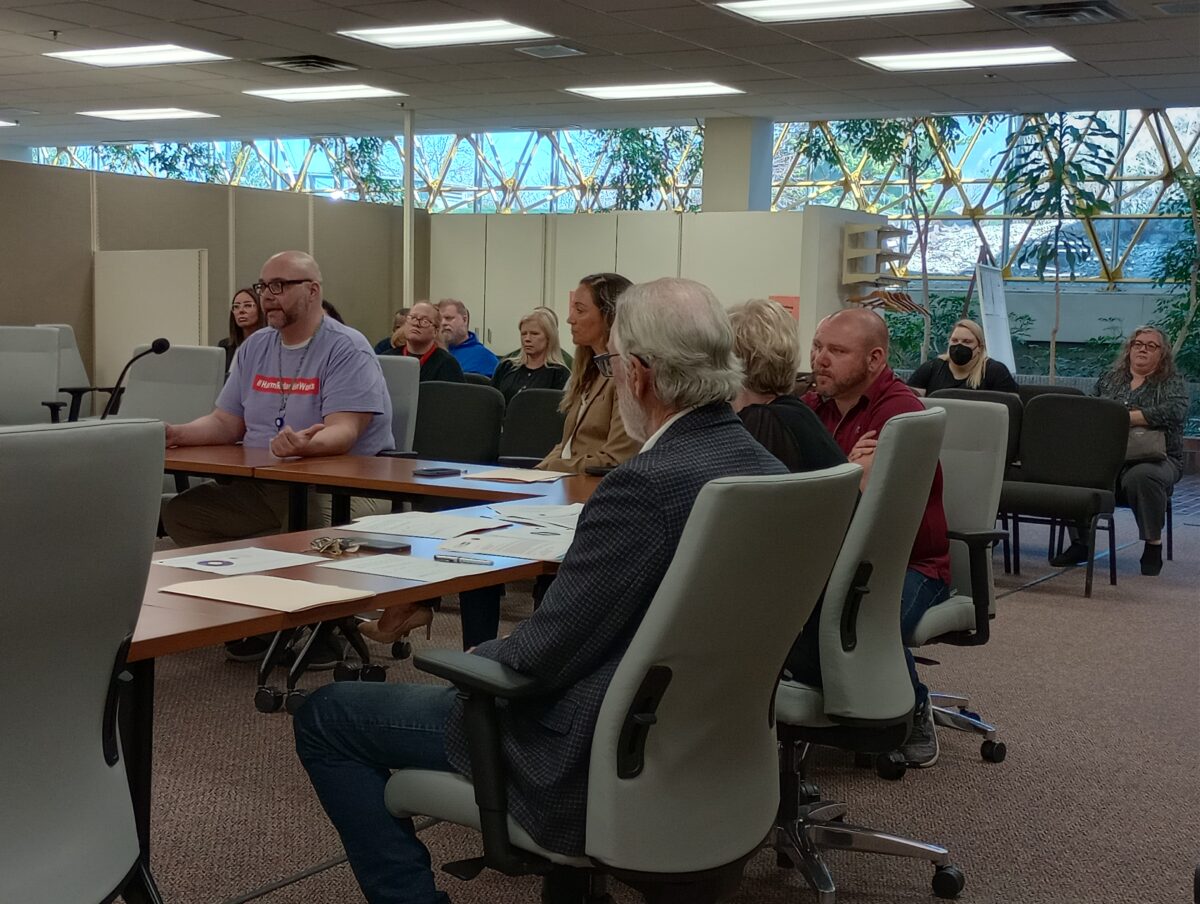Should Wayne County continue providing a syringe exchange program?
Since 2016, commissioners have decided yes, and again face that decision as the most recent two-year renewal expires June 30.
Christine Stinson, executive director of the Wayne County Health Department, formally requested April 12 that commissioners renew the program. They have the option of a one- or two-year renewal or to end the program.
No action was taken during that meeting so that commissioners can weigh the information provided by Stinson and program supporters, including Dr. Lindsay Weaver, the chief medical officer for the Indiana State Department of Health, and others from the state health department involved in harm reduction programs.
“It is an important spoke in the wheel of addressing drug issues,” Stinson said. “The syringe services program didn’t bring the drug problem to Wayne County; the drug problem in Wayne County brought the syringe services program.”
Implementation of the program during August 2016 aimed to impact the rising number of hepatitis C and HIV cases, diseases spread through needle sharing. Program supporters told commissioners it has done that while also providing other benefits such as referring people to drug treatment, providing medical tests and services, identifying pregnant women needing prenatal care and distributing Narcan that reverses overdoses and saves lives.
Weaver said 40 years of study have proven that syringe service programs are effective in reducing injection drug use and assisting individuals in recovery. She credited the state’s syringe programs with helping the state be named one of the top six states in the country that might eliminate HIV and hepatitis C.
Sheriff Randy Retter spoke against renewing the program. He sees needles supplied by the program that are misused and said providing tools for illegal activity puts law enforcement in a difficult position. Retter questioned the validity of supporting statistics provided for the program and whether a syringe exchange is the best way for the county to provide services.
Through the presentation, the exchange was described as a carrot that helps health officials provide participants other services and build relationships that can lead to eventual participation in treatment programs.
Stinson said that the department’s harm reduction efforts would continue even without the syringe program’s renewal; however, the effort would be like “the stick and the string without the carrot.” The program would lose state funding that would be redirected toward the state’s other seven exchange programs and it would lose the $30,000 the Reid Health Foundation provides to purchase needles.
Dr. David Jetmore, the county’s health officer, flew back from Egypt to support the program’s renewal. He said the program helps those addicted to drugs and prevents disease, and he feels sorry for Indiana counties without a program.
“Wayne County is clearly a progressive community that cares about the health of its citizens,” Jetmore said. “I think we’ve shown it’s done good and will continue to do good. We should be proud of ourselves.”
Weaver put the state agency’s support behind program renewal. The packet of information Stinson provided commissioners also included a letter of support from Dr. Kristina Box, the state health commissioner.
“Syringe service programs are proven to reduce the spread of disease and are a keystone to efforts in epidemics of HIV and hepatitis C in our state,” Weaver said. “For individuals battling substance use disorder, syringe service programs are a vital form of harm reduction because of the breadth of services and really, the touchpoint they provide.”
Overdose deaths, disease spread reduced
Wayne County’s program has served 1,191 participants since its inception, including about 600 during the past year, according to Stinson’s statistics. Stinson also said the program, which is a one-for-one needle distribution, has distributed 310,123 syringes and collected 269,451 through the program, while collecting another 320,174 syringes through other community efforts.
The exchange has distributed 2,848 doses of Narcan, with participants reporting they used 1,266 of those doses. Stinson credits that, plus other community Narcan distribution with 17 fewer overdose deaths during 2022 compared with 2021.
Exchange participants also self-reported receiving 2,207 HIV tests. The program itself in 2022 conducted 689 HIV tests with one positive result and 525 hepatitis C tests with 97 positive results. Stinson said the targeted testing of the most at-risk population leads to treatment that has slowed the disease’s spread. A legislation change also now enables active drug users to receive hepatitis C treatment.
Jeremy Turner, a division director for the state health department, said that an exchange entices those receiving treatment for HIV or hepatitis C to return and continue treatments. Turner was asked about feelings that an exchange enables drug use.
“There is no evidence that that’s contributing to increased use of substances, because people, when they have substance use disorder, they don’t care if they have a clean needle or not,” he said. “They’re going to find a way to use drugs, so if they don’t have a needle they’re going to smoke it, they’re going to snort it, they’re going to do whatever they’ve got to do.”
Phil Taylor of Choices Coordinated Care Solutions, one of several people affiliated with the local exchange to speak, told commissioners that he’s worked just two weeks with the exchange program and sees the fruit of the efforts. He said people who want to change their lives receive necessary assistance.
“I do think this is important,” he said.
A version of this article appeared in the April 19 2023 print edition of the Western Wayne News.

